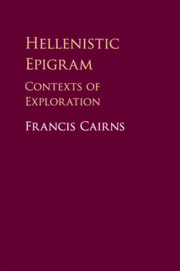Book contents
- Frontmatter
- Dedication
- Contents
- Preface
- Abbreviations
- 1 Introductory: Contexts and their Loss
- 2 Afterlives
- 3 Philosophical Matters
- 4 Temples and Shrines
- 5 Literary Polemics
- 6 Literary Polemics Continue
- 7 Poetry, Sex, the Countryside
- 8 Medical Connections
- 9 Epitaphs: Epigraphic or Epideictic?
- 10 Local Interests
- 11 Speakers, Addressees, Antecedents
- 12 The Erotic
- 13 Generic Innovation
- 14 Learning
- Bibliography
- Index Locorum
- Index Anthologiae Graecae
- Index of Personal Names in Epigrams
- General Index
5 - Literary Polemics
Published online by Cambridge University Press: 12 October 2016
- Frontmatter
- Dedication
- Contents
- Preface
- Abbreviations
- 1 Introductory: Contexts and their Loss
- 2 Afterlives
- 3 Philosophical Matters
- 4 Temples and Shrines
- 5 Literary Polemics
- 6 Literary Polemics Continue
- 7 Poetry, Sex, the Countryside
- 8 Medical Connections
- 9 Epitaphs: Epigraphic or Epideictic?
- 10 Local Interests
- 11 Speakers, Addressees, Antecedents
- 12 The Erotic
- 13 Generic Innovation
- 14 Learning
- Bibliography
- Index Locorum
- Index Anthologiae Graecae
- Index of Personal Names in Epigrams
- General Index
Summary
Many Hellenistic and post-Hellenistic epigrams have their context in literary polemics, scholarly interest in which was fuelled by the publication in the early twentieth century of new fragments of Callimachus’ Aetia, including much of its programmatic prologue. Callimachus was the leading poet, intellectual, and literary polemicist of his age, and his works were the most influential vectors to posterity of the ideas about poetry which he shared with his predecessors; principles compatible with his, as proclaimed by Hellenistic and Roman programmes, have therefore come to be thought of as ‘Callimacheanism’, and the ancient poets who subscribed to them as ‘Callimacheans’. These terms are, however, anachronistic: ‘Callimacheanism’ goes back at least to the fifth century BC; and, in the generation before Callimachus, Philitas and Theocritus produced poetic programmes which deeply influenced him. Nevertheless it would be impractical to abandon the concepts of ‘Callimacheanism’ and ‘Callimacheans’; so, with the above caveats in mind, these terms will be employed as shorthand without further qualification in this and succeeding chapters.
Literary programmes are one of the few areas of ancient poetry in which symbolism is assured and universally acknowledged: pairs of antithetical symbols such as seas and large rivers versus small springs, thunder-claps and donkey-brays versus the trills of cicadas, and highways for chariots versus little-trodden footpaths are now standard scholarly currency. Of course not all rivers and seas in ancient poetry are literary metaphors, and not every donkey a bad poet. A poem's role as prologue (initial or in medio) or epilogue can be a good predictor of symbolic and programmatic intent, but, since most Hellenistic epigrams have reached us divorced from their original circulation contexts, this criterion is not often applicable. However, overt expressions of literary interest and/or the presence of standard literary symbolism may prompt recognition of an epigram's literary-polemical context, and in some cases may authorise the hypothesis that it once functioned as prologue or epilogue to a collection.
The Aetia prologue and a few other Callimachean passages present a clear picture of his literary aspirations: labour, purity, craftsmanship, piety, sweetness, smallness, slenderness, lightness, and originality. His works overall reveal his complex relationship with Homer: while sharing the standard Greek adulation of Homer, Callimachus deprecated attempts at large-scale Homeric imitation, and to some extent he prized brevity for its own sake.
- Type
- Chapter
- Information
- Hellenistic EpigramContexts of Exploration, pp. 125 - 159Publisher: Cambridge University PressPrint publication year: 2016
- 1
- Cited by



